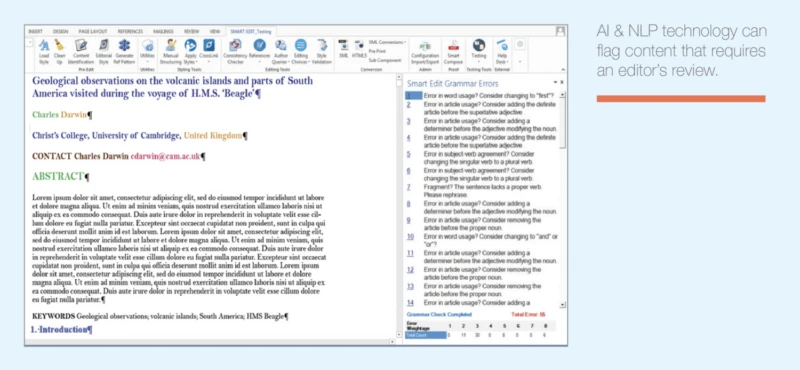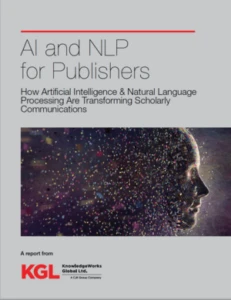A free report from KnowledgeWorks Global Ltd.
You may have heard how artificial intelligence (AI) is being deployed within the information industry to combat fake news, detect plagiarism, and even recommend content to users. Until now however, AI has had minimal impact on the content creation and editorial functions of the publishing ecosystem. For scholarly publishers in particular, AI capabilities have advanced to a degree that they can actually automate significant portions of their workflows, with massive implications for their businesses, their authors and the research community.
AI is a method by which humans train machines to identify patterns and learn new patterns. It involves developing algorithms that enable machines to quickly process large swaths of data, recognize the patterns within that data, and make decisions or recommendations based on that analysis.
Natural language processing (NLP) incorporates grammar analysis into machine-learning. A computer program is trained to recognize the noun, verb, and object in a sentence, and to understand the structure of words in order to discern their meaning.
With NLP technology, publishers can automate simple editing and formatting tasks and focus their energy on adding greater value to the content. They can also manage more journal submissions or speed up tedious peer review without significantly increasing staff or production costs.
Traditionally, all articles submitted to an academic journal undergo a similar process with multiple rounds of corrections and changes before copyediting, formatting, composition and proofing. All told, this system could take several weeks before the article is published.
On the other hand, AI and NLP technology can implement pre-set grammar and formatting rules to analyze the content and score articles for quality. The technology will automatically correct minor errors like grammar and punctuation, and flag more complex issues that may need an editor’s attention. Journal submissions that are high-quality and can advance straight to the typesetting and composition stage.

Because editing is often the most time-consuming part of the production process, fast tracking high-quality articles to the composition stage can save a significant amount of time for publishers—while also improving the author experience.
In our latest report, AI and NLP for Publishers, we explore how AI and NLP are being used today in scholarly publishing and how it may impact the evolution of research. We also explore how the technology works and how publishers like Taylor & Francis are, with the help of KnowledgeWorks Global Ltd., realizing the benefits of intelligent automation.
Smart Suite 2.0 is KGL’s integrated, cloud-based publishing engine combining AI and system intelligence to achieve accelerated workflows.






